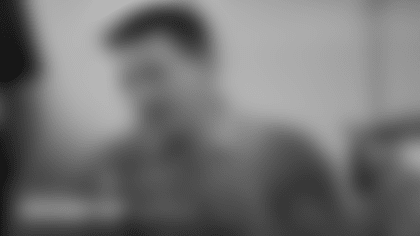The Seahawks kick off the second half of their season Sunday when they host the Tampa Bay Buccaneers. To find out more about this week's opponent, to Buccaneers.com senior writer Scott Smith, who answered five questions about the Bucs.
Q: It's been a crazy month or so of travel for Tampa Bay with trips to L.A., London and now Seattle, plus a couple of other road games. How big of a toll has that taken on the team/how are they handling it?
Smith: It's a little weird to think that this weekend's trip to Seattle is finally the end of this run because it has been a hot topic around here since the day the schedule dropped in April. For anyone who doesn't know the details, the Buccaneers played a home game in Week Three on September 22 and then didn't have another game scheduled for Raymond James Stadium until November 10. In between: four road games, one outing that was technically a "home game" in London, a bye week and approximately 20,400 air miles traveled, which is just a bit less than the team flew in the 2017-18 seasons combined.
The initial reaction to that stretch in the schedule was, shall we say, an unhappy one, but after voicing their displeasure the Bucs got right to planning. Bruce Arians has assembled a large "sports science" staff, and that crew worked hard to find ways to help the players adjust to all the travel and time zone changes. It seems to have worked. There have been few complaints from the players and Arians said on Wednesday that this stretch has not been worse than he expected. That said, the trip to Seattle is really not that much shorter than the one to London, but in the opposite direction, so Arians believes the real test – the "telltale," as he said on Wednesday – will be how the players feel next week after finally returning home. So we'll see.
Of course, from a bottom-line perspective, maybe it has taken a toll. After a rousing win over the Rams in L.A. in Week Four, the Bucs have dropped three in a row. A win in Seattle to conclude the trip would be helpful, and this team is definitely still chasing the same goals, but even 3-5 is a tough place from which to start a second-half playoff run.
Q: The Bucs have turned the ball over 17 times this year, including 11 times in the past two games, how big of a concern is that, and what needs to be done to clean that up?
Smith: You don't have to watch a minute of tape to know that is an enormous concern. It is virtually impossible to win when you're turning the ball over around five times a game. Those 11 giveaways have masked the fact that the Bucs' defense has played better in the last two weeks, allowing fewer than 275 yards to both the Panthers and the Titans. Unfortunately, in those same two games the Bucs' opponents had scoring drives of 10, six, -2, 36, eight and six yards. The defense has simply been put in too many bad situations, and while it would like to have been more sturdy in the red zone, particularly in last week's loss in Nashville, there's only so much it can do.
How do you fix it? It would be nice if there was one simple answer, but the causes of these turnovers have been varied and plentiful. As an example, Jameis Winston was credited with a fumble in the last game when the snap came too early and hit him in the facemask before he was even looking at center, and that early snap was the result of a bit of miscommunication between linemen. It's hard to see that one coming. Winston also had two interceptions in that game but Arians was adamant that both were the result of route-running mistakes by receivers. Winston definitely made some mistakes in his five-interception game in London, but there were protection issues in that contest as well. It's just been a lot of little things, and it's those little things that have the Bucs where they are in the standings, even though they believe themselves to be a better team than the record indicates. Here, allow me to let Winston explain:
"Yeah, little things will always get you. That is the difference between a great team and a good team. To win, you have to be great on Sunday, you can't just be good. We are typically good. That is why we are 2-5 right now, but we've got to keep working to be great. We [need] to fix the little things because little things add up. One small thing is going to turn out to be a big thing. That's what we've got to focus on – doing one small thing right, finding a crumb and doing our job."
Q: Shaquil Barrett's torrid start to the season probably wasn't sustainable, but how much have teams adjusted in how they block him? And on a related note, how does Jason Pierre-Paul's return change things for the pass rush?
Smith: Yeah, you're not going to see a lot of nine-sack months, but it really wasn't a fluke. Shaq Barrett got a lot of one-on-one pass rush opportunities in September and he won them at, as you say, a rate that probably wasn't sustainable. That said, what Barrett showed in that month is what the Bucs thought he could be when they signed him in free agency and gave him a larger workshare after he had flashed in more of a rotational role in Denver. The opposition finally started to adjust in Week Five and Barrett was held without a sack in the next two games as he saw a whole lot of chips and double teams. It was inevitable, really, but it was also unlikely that he would continue to be shut out for long. Sure enough, Barrett got his 10th sack in Nashville last Sunday and he remains tied for the league lead in that category.
Jason Pierre-Paul's return probably had something to do with that. JPP didn't wait long to announce his presence – on his very first defensive snap played this season he dropped Ryan Tannehill for a sack. Later, both Barrett and Carl Nassib, the two players who took the vast majority of the edge-rushing snaps in Pierre-Paul's absence, got sacks too. The veteran pass-rusher's return should help Barrett and Nassib in a couple ways. One, opposing defenses have to respect Pierre-Paul as a threat; he also had three tackles for loss and another quarterback hit in his return. Two, the other pass rushers will see a slight reduction in their snap counts, which will hopefully keep them fresh at the end of games. Todd Bowles has a lot of different ways to deploy those three guys along with down linemen like Ndamukong Suh and Vita Vea, and there were times in last weekend's game when Pierre-Paul, Barrett and Nassib were all on the field together.
Q: Bruce Arians' Cardinals teams had more success at CenturyLink Field than most teams, is that something he's bringing up this week/hoping can help, or is it a non-factor given that he's with a different team now?
Smith: Coach Arians didn't bring that up, but someone else did during his post-practice media session on Wednesday. It's a nice note, complete with that "our house" exchange from one of his previous trips there with the Cardinals, but it probably doesn't have much relevance. Those Arizona teams also won four of their five games after bye weeks, and the Bucs just lost in that same situation.
That said, I would imagine that his experience coaching teams at CenturyLink Field will help him prepare this one to succeed in that environment, to communicate effectively despite the noise. Arians said that a lot of those games with the Cardinals were close ones that came down to the end, so the key was to hang in there, not get overwhelmed by the crowd (and the Seahawks!) and have a chance to win it at the end. That lattermost point is a big one, because it's exactly what the Buccaneers players are harping on this week, following an impassioned speech by team leader Lavonte David in the postgame locker room in Nashville. They're tired of not being the team that makes the big plays at the end of games to get the win. They want to finish better.
Q: Just looking at the numbers, it seems like it has been an odd year for Tampa's defense, which is the toughest team to run against in the NFL, but has given up a ton of passing yards and points. What's led to that discrepancy, and what's the feeling about that unit overall?
Smith: Yes, first in the league in rushing defense and 31st in passing defense is an eye-catching imbalance. The run defense is legitimately great, not just a product of game situations. In most cases, the Bucs have shut down the opposition's rushing attack from the jump, despite playing against such prolific running backs as Christian McCaffrey, Todd Gurley, Alvin Kamara, Saquon Barkley and Derrick Henry. The interior-line trio of Suh, Vea and Will Gholston (with help from Beau Allen and Rakeem Nunez-Roches) has been nearly impenetrable, and those guys deserve a lot more credit than their raw statistics would imply. The front seven as a whole, with David and rookie Devin White as the inside linebackers, is coming off a very good game in Tennessee, its best of the season so far according to Arians.
The secondary is young and still finding itself, and at times has had communication issues. They've also faced a very high volume of passes because opposing teams have had to abandon the run. In Week Four the Rams essentially didn't even bother trying to run the ball; Gurley didn't get a single handoff until halfway through the second quarter. That group came back from the bye week believing it had ironed out some of those communication problems, and while there were still a few in the Titans game the coverage was clearly better. The Titans' wideouts only accounted for about 60 receiving yards, though the tight ends proved to be a bit of a problem. Cornerback Carlton Davis had three of the team's eight pass break-ups, and that didn't even count the two interceptions he had overturned by penalties. The Bucs have also made some changes in the secondary; rookie Sean Murphy-Bunting replaced M.J. Stewart as the nickel back a few games ago, and then in last week's contest Vernon Hargreaves played outside in the base defense but moved into the slot in the nickel, with Murphy-Bunting playing outside.
As for the points, I go back to the last question. The Bucs have given up three defensive touchdowns, and that averages out to three points a game right there. Otherwise there have been too many short fields, as mentioned above.






